Shopify is widely regarded as one of the best eCommerce platforms for launching an online store. Its intuitive design, extensive app marketplace, and robust features have made it a favourite among entrepreneurs and businesses around the globe. However, while Shopify offers a comprehensive solution for many, it’s not necessarily the ideal fit for everyone. Depending on your unique business needs—whether it’s cost, customization, advanced features, or scalability—you may find that a Shopify alternatives platform is better suited to achieving your goals.
In this guide, we’ll take a closer look at why you might consider alternatives to Shopify. We’ll explore the strengths and features of some of the most popular eCommerce platforms, providing insight into how each one stacks up. Additionally, we’ll break down the key factors to consider when choosing your next platform, ensuring it aligns with your business objectives, budget, and technical expertise.
By the end of this guide, you’ll have a well-rounded understanding of your options and a clear strategy for selecting the platform that best supports your business. Whether you’re just beginning your eCommerce journey or looking for a more scalable solution to grow your established online store, there’s Shopify Alternatives out there that can meet your specific needs and help you succeed in the competitive eCommerce landscape.
Why Consider Alternatives to Shopify For Your Online Store?
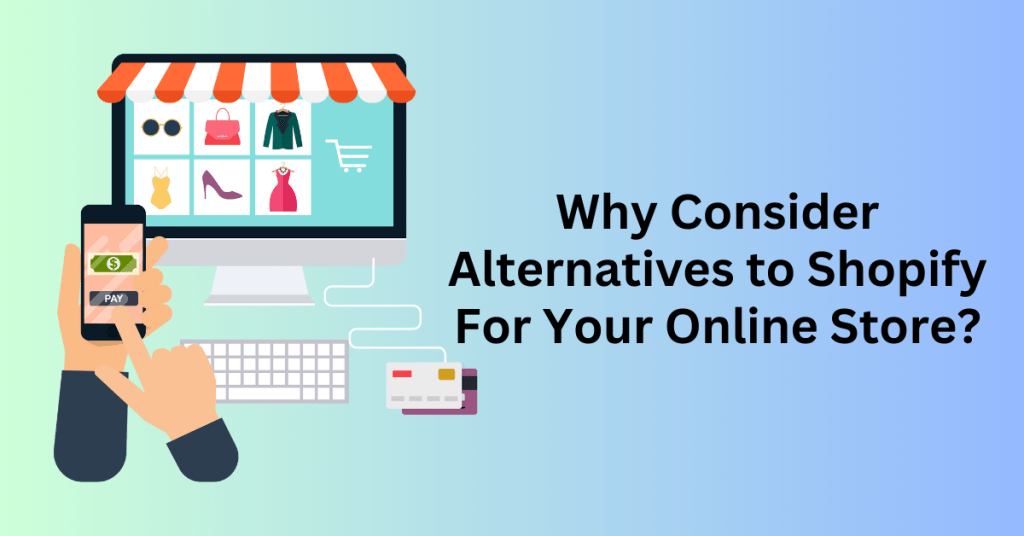
Shopify is undoubtedly a popular eCommerce platform, but it’s not the perfect fit for every business. Here’s a closer look at some reasons why you might want to explore other options:
1. Shopify Cost
While Shopify offers multiple pricing plans, it can become expensive as your business grows and requires more advanced features. Let’s break down the costs. Shopify’s plans start at a reasonable rate, but upgrading to unlock better tools can significantly increase your monthly expenses as your store scales.
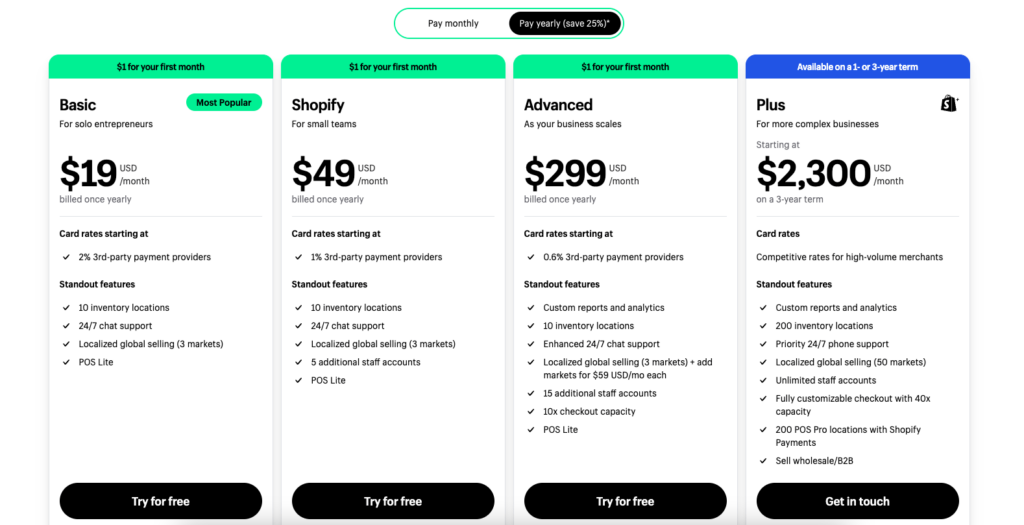
Unless you’re using Shopify Payments, the platform charges additional transaction fees, which can quickly add up when combined with fees from third-party processors like PayPal or Stripe. This extra layer of costs can significantly impact your profit margins, especially for high-volume stores.
Shopify’s App Store offers a wide range of tools for tasks like SEO, email marketing, and inventory management. While these apps can enhance your store’s functionality, many come with subscription fees. Relying on multiple apps to optimize your store can lead to substantial ongoing expenses, turning them into a financial burden over time.
Additionally, while Shopify provides free themes, the more polished and professional ones come at a cost. Upgrading or changing your theme to keep your site looking fresh and relevant can result in additional expenses as your store evolves. These factors highlight the importance of carefully managing costs when using Shopify for long-term growth.
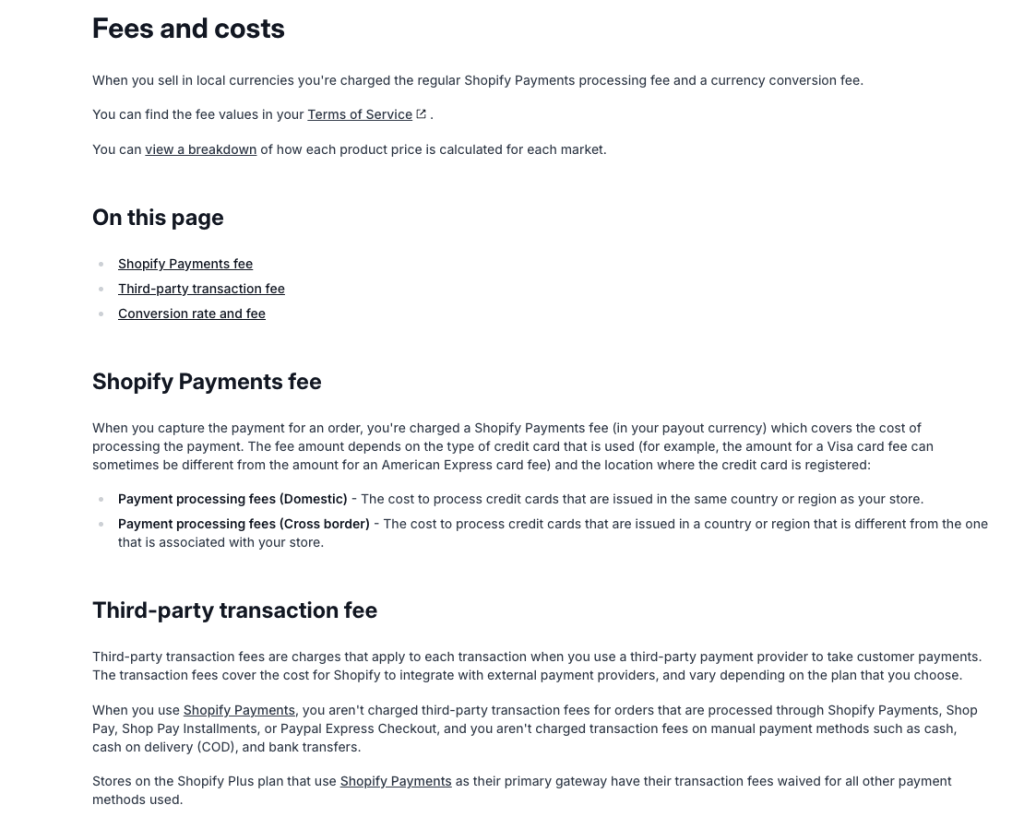
2. Customization Limitation
Shopify’s ease of use is one of its biggest advantages, making it a popular choice for businesses. However, its customization options can feel restrictive for those with unique needs. While Shopify offers attractive, mobile-friendly themes, their layouts may not perfectly align with your brand identity. Customizing these themes often requires knowledge of Shopify’s Liquid coding language, which can be a hurdle if you’re not a developer. Hiring a professional to handle these customizations can further increase your costs.
Although Shopify supports numerous integrations, it might not work seamlessly with niche tools, such as specialized payment gateways or regional shipping solutions. In such cases, custom development may be necessary to ensure smooth functionality. Furthermore, if your store requires features like personalized product options, advanced filters, or multi-language support, you may find Shopify lacking. Platforms like WooCommerce or Magento often offer greater flexibility to meet these demands, either through built-in features or plugins.
3. Advanced Features
Shopify is an excellent platform for straightforward online stores, but businesses with more complex needs may find its features limiting. For instance, stores with large inventories or products that have numerous variants might struggle with Shopify’s system, which can feel inadequate for managing such complexities. In comparison, platforms like BigCommerce and WooCommerce often provide better tools for handling intricate catalogues and pricing structures.
Managing multiple Shopify stores can also be cumbersome and expensive. Each store requires a separate subscription, and syncing data between them typically involves manual effort or reliance on third-party apps, which can add to the workload and costs. Additionally, Shopify’s basic SEO tools, such as editing meta tags, are useful but somewhat restrictive. The platform doesn’t offer full control over URL structures or canonical tags, which can hinder your search engine optimization efforts. By contrast, WooCommerce, built on WordPress, provides far greater flexibility. When paired with tools like the Yoast WooCommerce SEO plugin, it can significantly enhance your site’s search engine visibility.
Shopify’s built-in analytics are sufficient for small businesses, but more detailed reporting requires upgrading to higher-tier plans or integrating third-party apps. On the other hand, platforms like BigCommerce often include more robust reporting features as part of their standard offering, eliminating the need for additional expenses.
4. Scalability Limitations
Shopify is a strong option for smaller businesses, but scaling up can expose some of its limitations. As your store grows, so do your expenses. Higher-tier plans, managing larger inventories, and paying increased transaction fees can significantly reduce your profit margins over time.
Additionally, a growing business comes with evolving needs. Shopify’s limited flexibility and customization options can make it challenging to adapt your store to meet these new demands. Platforms like WooCommerce and Magento often provide more robust customization capabilities, making them better suited for businesses with complex or unique requirements.
Being a hosted platform, Shopify handles performance, security, and scalability for you, which simplifies operations for many users. However, this also means you’re reliant on its infrastructure and have little control over server-level customizations or optimizations. For businesses that require complete control over their site’s backend, self-hosted platforms like WooCommerce or Magento offer a better fit.
If adaptability, cost-effectiveness, and scalability are key priorities for your business, exploring Shopify alternatives might be a smarter long-term choice.
Shopify Alternatives 1: WooCommerce
WooCommerce is a robust, open-source eCommerce plugin designed specifically for WordPress. It allows businesses to create highly customizable online stores with an impressive range of features and integrations. With WooCommerce, you can design a professional, dynamic online store tailored to your brand’s specific needs. Its seamless integration with WordPress provides a solid foundation to enhance your website’s functionality and user experience.
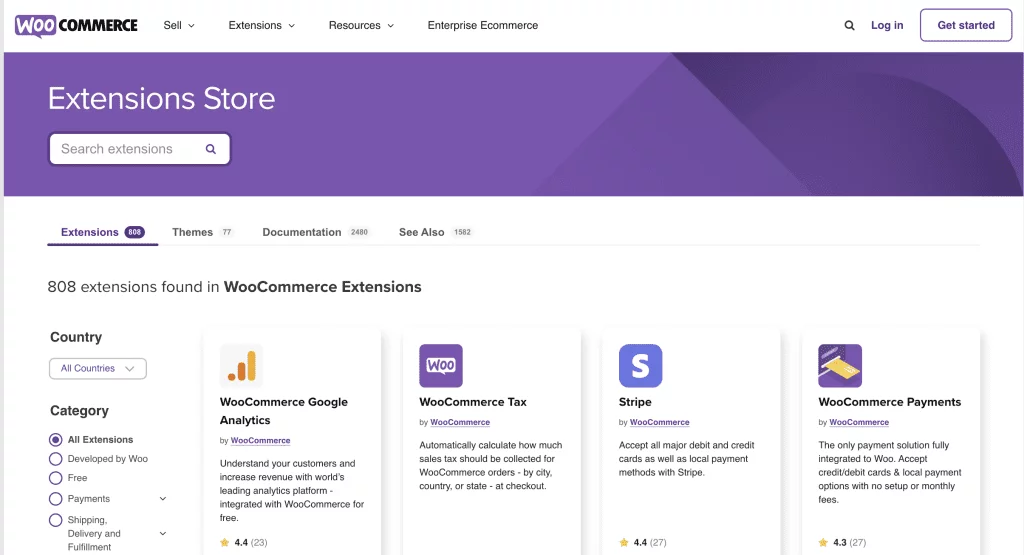
Key Features of WooCommerce:
- Built-in WordPress Compatibility: WooCommerce is designed to integrate seamlessly with WordPress, providing a cohesive experience for site owners.
- Endless Customization Options: Choose from a vast array of themes and plugins to create a store that reflects your brand identity.
- No Transaction Fees: Unlike some platforms, WooCommerce doesn’t charge additional transaction fees, though standard payment gateway charges still apply.
- Extensive Plugin Library: Access hundreds of free and premium plugins to expand your store’s functionality, from marketing tools to advanced analytics.
- SEO-Friendly Architecture: Leverage WordPress’s powerful SEO capabilities to boost your store’s visibility in search engines.
Why Opt for WooCommerce Hosting?
When it comes to hosting your WooCommerce store, having the right hosting provider is critical. Bluehost stands out as a leading choice, offering hosting solutions specifically optimized for WooCommerce. Their hosting plans are designed to deliver fast performance, easy setup, and scalability, ensuring your store runs smoothly as your business grows.
1. Free Domain for One Year
Get started with your WooCommerce store without worrying about domain costs. Bluehost offers a free domain name for the first year, giving you a professional online presence right away.
2. WooCommerce-Optimized Servers
Bluehost provides hosting environments fine-tuned for WooCommerce stores, ensuring fast load times and a seamless shopping experience for your customers.
3. Hassle-Free Setup with Automatic Installation
Setting up your WooCommerce store is simple with Bluehost’s automatic installation feature. Whether you’re a beginner or have limited technical expertise, you can launch your store quickly and efficiently.
4. Free SSL Certificate
Security is essential for any eCommerce store. Bluehost includes a free SSL certificate, ensuring secure connections and protecting your customers’ sensitive data, which helps build trust and meets compliance standards.
5. 24/7 Expert Support
Whether you’re facing technical challenges or need advice, Bluehost’s dedicated support team is available around the clock via phone, chat, or email to assist you.
6. Scalable Hosting Options
As your store grows, Bluehost offers scalable solutions to meet increasing traffic and sales demands. Upgrade to VPS or dedicated hosting as needed to maintain optimal performance.
7. Free Yoast SEO Subscription
Improve your store’s search engine ranking with the Yoast SEO plugin, included free with Bluehost’s hosting plans. This tool offers valuable insights into keyword optimization, meta descriptions, and title tags, ensuring your pages rank higher in search results.
8. Free Site Migration Tool
Switching to Bluehost is easy and cost-effective. Their free migration tool ensures all your website files, databases, and settings are transferred seamlessly, with no downtime or technical expertise required.
9. Built-in Product Add-Ons
Encourage cross-selling and upselling with WooCommerce product add-ons. You can offer customers additional products or services at checkout, increasing sales without complicating the buying process.
10. Subscription Management Made Simple
Recurring revenue is key to long-term success, and WooCommerce Subscriptions make it easy to offer subscription-based products or services. Whether it’s a monthly box or digital content, you can set up recurring billing with ease while ensuring secure transactions and a smooth user experience.
Bluehost’s WooCommerce hosting is perfect for businesses of all sizes. Whether you’re just starting out or looking to scale your existing store, Bluehost provides an affordable and reliable solution. Their hosting plans offer easy setup, excellent performance, and the flexibility to grow with your business. From small startups to established enterprises, Bluehost has the tools and support you need to succeed with your WooCommerce store.
Shopify Alternatives 2: BigCommerce
BigCommerce is a leading SaaS-based eCommerce platform designed to support businesses seeking scalability and advanced features. It goes beyond the capabilities of traditional website builders by offering an extensive suite of tools that enable businesses to manage and expand their online presence seamlessly across multiple sales channels. With its all-in-one approach, BigCommerce is an excellent choice for growing businesses and enterprises that require robust eCommerce functionality.

Key Features:
- Comprehensive eCommerce Tools: Every plan includes a full range of features to help you manage and optimize your store, from inventory management to analytics.
- Scalability for All Business Sizes: BigCommerce caters to small businesses, growing companies, and large enterprises alike, providing solutions tailored to your needs.
- User-Friendly Visual Editor: The drag-and-drop editor allows you to customize your store without requiring coding knowledge.
- Versatility Across Industries: BigCommerce supports a variety of business models, making it suitable for a wide range of industries and product types.
- Advanced Sales Channel Integration: Effortlessly manage and sell across multiple platforms, including social media, marketplaces, and your online store.
BigCommerce is ideal for businesses of all sizes, particularly those looking for an all-in-one eCommerce platform that combines advanced functionality with ease of use. Whether you’re a small startup or a large enterprise, BigCommerce provides the tools and flexibility needed to grow and succeed in today’s competitive online marketplace.
Shopify Alternatives 3: Wix Stores
Wix is an intuitive platform that offers a drag-and-drop editor, enabling users to create online stores quickly without any coding skills. It’s an excellent choice for small businesses or individuals looking for a straightforward solution with essential eCommerce features.
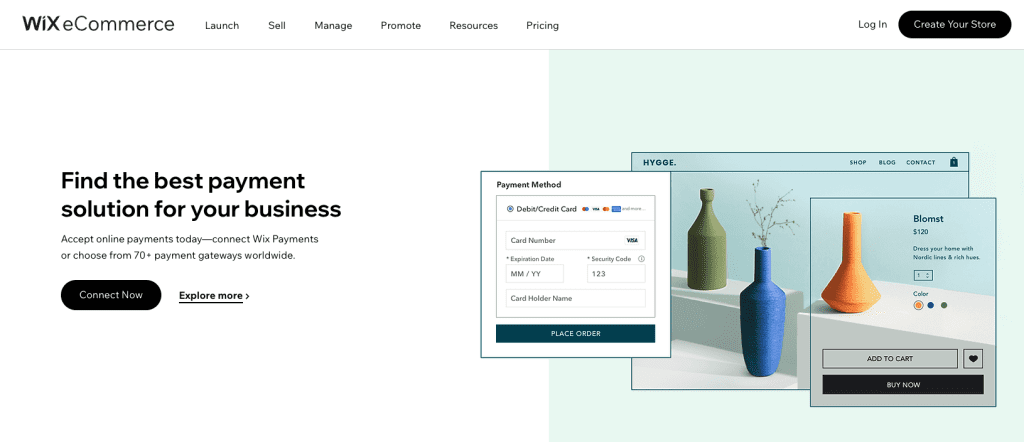
Key Features:
- Beginner-Friendly Design: Wix simplifies website management, making it accessible for those with little to no technical experience.
- Versatile Add-Ons: Beyond eCommerce, Wix provides a variety of add-ons to enhance your site’s functionality, such as booking systems and marketing tools.
- Built-In SEO Tools: Wix includes integrated SEO features to improve your store’s visibility in search engine results.
- Mobile Accessibility: Manage your store on the go with Wix’s mobile-friendly tools, ensuring you can update and monitor your site anytime, anywhere.
Wix is ideal for small businesses or individuals who need a beginner-friendly platform to quickly set up an online store with minimal effort.
These Shopify competitors offer a range of features and pricing plans, allowing you to choose the best eCommerce platform based on your store’s needs, size, and growth potential. Whether you’re running a small business or managing a larger enterprise, there are many alternatives to Shopify that provide robust eCommerce solutions tailored to your requirements.
Key Considerations When Choosing a Shopify Alternatives eCommerce Platform
Selecting the right eCommerce platform is one of the most crucial decisions you’ll make when building an online store. To ensure the platform you choose aligns with your business objectives and long-term goals, it’s essential to evaluate several critical factors. Here’s a comprehensive breakdown of what to consider:
1. Ease of Use
For entrepreneurs without advanced technical expertise, ease of use should be a top priority. A platform with a straightforward setup process and an intuitive interface can save you countless hours of frustration. Choose a solution that enables you to launch and manage your store efficiently without requiring coding knowledge or extensive configurations. For example, platforms like Squarespace and Wix are known for their drag-and-drop simplicity, while WooCommerce offers flexibility but may have a steeper learning curve if you’re unfamiliar with WordPress.
2. Cost and Affordability
Running an online store involves more than just the monthly subscription cost of an eCommerce platform. Carefully analyze all associated expenses, including transaction fees, hosting, premium themes, plugins, and third-party integrations. While Shopify offers tiered pricing plans such as Basic Shopify and Advanced Shopify, the costs can add up quickly, especially with added transaction fees for non-Shopify Payment gateways.
In contrast, WooCommerce is a free, open-source platform, though you’ll need to budget for hosting (such as Bluehost), a domain name, and optional premium extensions. For small businesses or startups, WooCommerce often proves to be more cost-effective in the long run than Shopify.
3. Features and Functionality
The tools and capabilities offered by an eCommerce platform should directly address your business needs. When comparing platforms, focus on the features that matter most to your operations:
- SEO Tools: A strong SEO strategy is essential for driving organic traffic to your store. Platforms like WooCommerce and BigCommerce offer powerful SEO features, such as customizable meta tags, URL optimization, and control over product descriptions. While Shopify also has built-in SEO tools, it may not match the flexibility of open-source platforms.
- Inventory Management: Efficient inventory management can make or break your ability to fulfill orders promptly. Shopify includes basic inventory tools but may require additional apps for advanced capabilities. WooCommerce provides more robust inventory management options out of the box, including automated stock alerts and detailed product tracking.
- Multi-Channel Selling: Selling across multiple platforms like Amazon, eBay, and social media is becoming increasingly important. Platforms like BigCommerce and Ecwid excel in multi-channel integration, often without extra fees. Shopify also supports this but may charge additional costs for certain integrations.
4. Scalability
Your eCommerce platform should grow with your business. While Shopify works well for small to medium-sized businesses, scalability can be expensive as transaction volume increases. Additionally, Shopify’s customization limitations may hinder larger enterprises or highly specialized stores.
On the other hand, WooCommerce, as an open-source platform, offers nearly limitless scalability. You have full control over your website’s customization and functionality, making it an excellent choice for businesses planning to expand significantly.
5. Customer Support and Resources
Reliable customer support can save you from operational headaches, especially when you’re troubleshooting technical issues. Shopify provides robust support, including 24/7 live chat, email, and phone assistance. However, premium support may come at a higher cost, particularly if custom solutions are needed.
WooCommerce’s support structure relies more on its active community forums, comprehensive documentation, and third-party developers. If you choose WooCommerce, pairing it with a reliable hosting provider like Bluehost can make a difference, as Bluehost offers outstanding hosting-related support. For WooCommerce-specific issues, you may need to seek help from freelancers or agencies specializing in WordPress development.
The ideal eCommerce platform for your business depends on your specific goals, technical expertise, and budget. Shopify is an excellent choice for businesses seeking ease of use and a wide range of integrated features, albeit at a higher cost. Meanwhile, WooCommerce is perfect for entrepreneurs who prioritize flexibility, scalability, and cost-efficiency, particularly if they’re comfortable with a bit of technical setup or are willing to hire a developer.
By carefully weighing these factors, you can make an informed decision and choose a platform that sets your online store up for long-term success.
Additional Factors to Consider When Choosing a Shopify Alternatives
When selecting an eCommerce platform, it’s essential to look beyond the basic features and pricing. A platform that meets your business needs while providing an optimal experience for both you and your customers can make a significant difference in your online success. Here are some additional factors to keep in mind:
1. User Experience (UX)
The user experience plays a crucial role in how effectively you can manage your store and how enjoyable the shopping experience is for your customers. A platform with an intuitive, user-friendly interface allows you to handle day-to-day tasks like adding products, managing orders, and updating content with ease.
For your customers, a clean, responsive layout with smooth navigation is essential. A confusing or clunky user experience can lead to higher bounce rates and cart abandonment. Platforms like BigCommerce and Wix often focus on providing easy-to-use dashboards and shopping interfaces, making them solid choices for businesses prioritizing UX.
2. Design Flexibility
The visual appeal of your online store can impact how customers perceive your brand. Investigate the range of design templates and themes offered by the platform.
- Customizability: Platforms like WooCommerce and Webflow allow for extensive customization, letting you tailor your site’s appearance and functionality to fit your brand identity. These are great for businesses looking for creative freedom.
- Ease of Use: Conversely, platforms such as Squarespace and Wix provide pre-designed themes that are easy to implement, ideal for those without design experience.
Consider whether you want a highly unique design or a simpler, quicker setup when evaluating design options.
3. Payment Gateway Integrations
A wide range of payment options ensures your customers can complete transactions using their preferred method. When evaluating platforms, check whether they support popular payment gateways like PayPal, Stripe, Apple Pay, and Google Pay.
Some platforms may impose additional transaction fees for certain gateways, so be sure to assess how this impacts your overall costs. WooCommerce, for instance, provides seamless integration with most payment processors, while Shopify charges extra fees unless you use Shopify Payments.
4. Security Features
Protecting your business and your customers’ sensitive information is non-negotiable. Verify that the platform you’re considering includes robust security measures such as:
- SSL Certificates: Essential for encrypting data and ensuring secure transactions.
- PCI Compliance: Adherence to Payment Card Industry standards for secure payment processing.
- Data Protection Tools: Features like fraud detection and malware scanning add an extra layer of security.
Platforms like BigCommerce and Shopify offer built-in security features, while WooCommerce’s security depends heavily on your hosting provider. Partnering with a reputable hosting provider like Bluehost can help fill this gap.
5. Mobile Compatibility
With mobile commerce accounting for a significant portion of online shopping, it’s vital to ensure your eCommerce platform is mobile-optimized. Key aspects to evaluate include:
- Responsive Design: Your website should automatically adapt to different screen sizes for a seamless browsing experience on smartphones and tablets.
- Mobile-Specific Features: Look for features such as mobile-friendly checkout, product pages, and payment options to cater to on-the-go shoppers.
- Admin Tools: Platforms like Shopify and BigCommerce offer mobile apps, allowing you to manage your store from your smartphone or tablet.
By prioritizing mobile compatibility, you can attract and retain more customers while improving overall sales performance.
While ease of use, cost, features, scalability, and support are foundational factors, additional considerations like user experience, design flexibility, payment gateway options, security, and mobile optimization can significantly enhance the functionality and success of your online store. Whether you’re drawn to WooCommerce’s flexibility, BigCommerce’s robust features, or Wix’s design simplicity, evaluating these aspects will help you choose Shopify alternatives that align with your goals and deliver an exceptional experience for you and your customers.
Final thoughts: 3 Powerful Shopify Alternatives to Elevate Your Online Store
Selecting the right eCommerce platform is a decision that should align with your specific business goals, budget, and technical expertise. While Shopify is a widely recognized and reliable platform, it’s not always the best fit for every business. Depending on your needs, you may find that Shopify Alternatives platforms provide greater functionality, cost savings, or customization options.
For small businesses, simplicity and user-friendliness are often the most important factors. Platforms like Wix or Squarespace might be ideal, offering easy setup processes and straightforward management tools. On the other hand, enterprise-level businesses often require advanced features, robust integrations, and scalability. Platforms like BigCommerce or WooCommerce are better equipped to handle larger, more complex operations while allowing for significant customization and flexibility.
Regardless of your business size, the right eCommerce platform should not only meet your current requirements but also support your long-term growth. Take the time to thoroughly evaluate your business’s unique needs, such as budget constraints, required features, and potential for expansion.
Whether your priority is affordability, functionality, or customization, choosing a platform that aligns with your vision will be a key driver of your success in the competitive eCommerce space. With the right tools, you’ll be better positioned to scale your business, attract customers, and achieve your goals.

